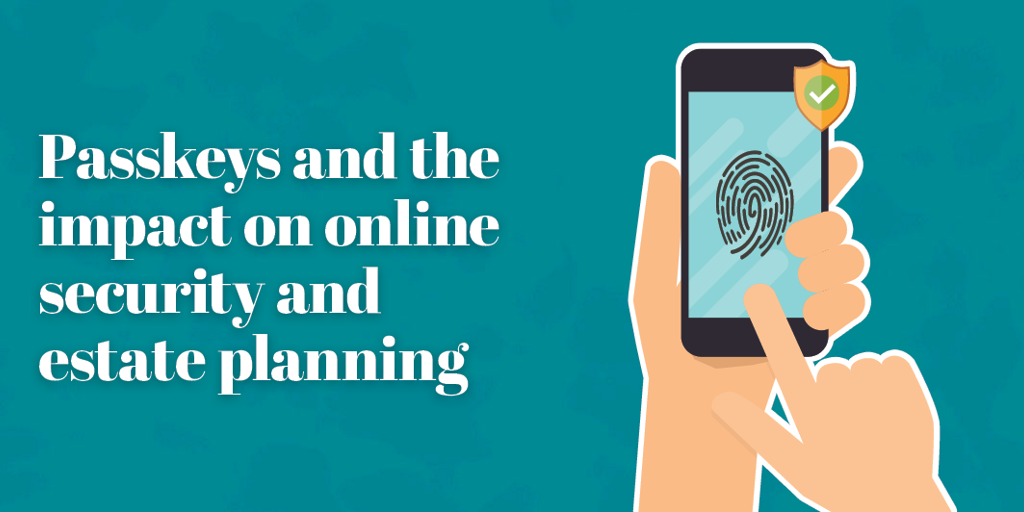


Passkeys and the Future of Estate Planning
One of the more frustrating aspects of modern technology is the necessity of passwords for gaining access to devices and data. In February 2013, the Fast Identity Online Alliance was launched to set standards that will enable reduced reliance upon passwords. In its June Developer Conference, Apple announced that beginning this fall it will be replacing passwords with passkeys, relying on biometric data for implementation (fingerprints or face ID). Other firms are expected to follow suit.
will enable reduced reliance upon passwords. In its June Developer Conference, Apple announced that beginning this fall it will be replacing passwords with passkeys, relying on biometric data for implementation (fingerprints or face ID). Other firms are expected to follow suit.
The new approach may simplify daily interactions with digital devices, but it could complicate estate planning and estate settlement. Common types of digital assets to be concerned about include:
- Personal. Personal digital assets include e-mail and text messages, e-books (e.g., Kindle and Nook), word processing and pdf files, photographs, videos, music files (e.g., mp3s and iTunes), spreadsheets, PowerPoint presentations, tax records and returns, and similar materials. They may be stored on a variety of devices, such as computers, tablets, smartphones, e-readers, cameras, hard drives, memory cards, CDs and DVDs, or online in the cloud. Each of these storage techniques often requires different means of access, including usernames, passwords, or answers to “secret” questions.
- Financial Accounts. Many people manage their financial affairs online, including bank and PayPal accounts, investment and brokerage accounts, bill payment (e.g., utilities, credit cards, car note payments, mortgage payments), and income taxes.
- Business Accounts. Business owners are likely to have customer databases containing names, addresses, and credit card information, along with information such as order history and pending orders. A professional such as a physician, attorney, or CPA may have client records, many of which will contain confidential information.
- Other Digital Assets. In this category are items such as domain names, blogs, loyalty program benefits (e.g., frequent flyer miles, credit card rewards, and business discounts or vouchers), and gaming property (e.g., virtual money, avatars, or other assets earned when playing online games).
Why is it important to include access to digital assets in the estate plan?
- Assist others upon death or incapacity. When individuals are prudent about their online life, they have many different usernames and passwords for their accounts. This is the only way to secure identities, but this devotion to protecting sensitive personal information can wreak havoc on families and fiduciaries upon incapacity and death as their rights to access digital assets are often unclear, as discussed below. Proper planning may make this process less complicated.
- Reduce Identity Theft. In addition to needing access to online accounts for personal reasons and closing probate, family members need this information quickly so that a deceased’s identity is not stolen. Until authorities update their databases regarding a new death, criminals can open credit cards, apply for jobs, and get state identification cards under a dead person’s name.
- Avoid Losing a Personal Story. Many digital assets are not inherently valuable, but are valuable to family members, who extract meaning from what the deceased leaves behind. Historically, people kept special pictures, letters, and journals in albums, scrapbooks, or shoeboxes for future generations. Today, this material is stored on computers or online and often is never printed. Personal blogs and Twitter feeds have replaced physical diaries, and e-mail messages have replaced letters. Without alerting family members that these assets exist and without telling them how to get access to them, the story of the life of the deceased may be lost forever. This is not only a tragedy for family members but also, possibly, for future historians, who are losing pieces of history in the digital abyss.
If you have ignored this part of your estate planning, now would be a good time to start paying attention to it.
© 2022 M.A. Co. All rights reserved.
Recent Articles
Join our e-newsletter
Sign up for our e-newsletter to get new content each month.






















